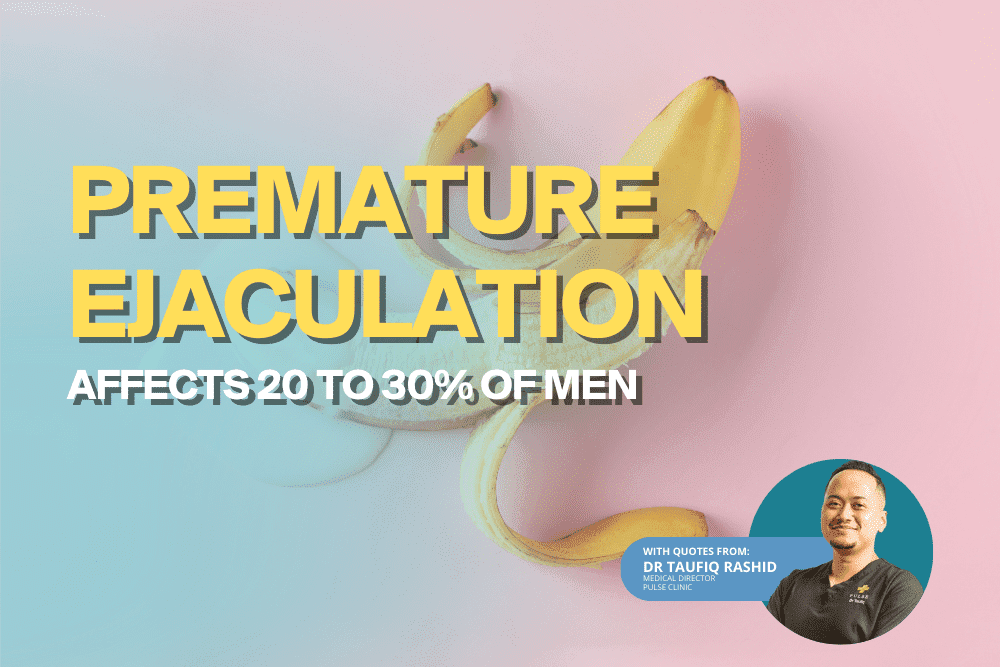Premature ejaculation (PE) is a common sexual health issue faced by men, characterised by ejaculation that occurs sooner than desired, either before or shortly after sexual penetration, causing distress to one or both partners.
This condition is one of the most common forms of male sexual dysfunction and has various causes and potential treatment options. We learn more about this condition from a medical perspective with Dr Taufiq Rashid, physician at Pulse Clinic.
What is Premature Ejaculation?
PE typically refers to ejaculation that occurs within one minute of penetration. However, it’s not solely a matter of time but also involves the lack of control over ejaculation and subsequent emotional and relationship stress. It can be classified into two types: primary (lifelong), occurring since the beginning of sexual maturity, and secondary (acquired), developing after previous sexual experiences without ejaculatory problems.
Dr Taufiq considers the duration of premature ejaculation as penetration that is “typically less than 3 minutes. This condition is quite common, and ranges affects 20-30% of men.”
Causes of Premature Ejaculation
The causes of PE can be both psychological and biological. Psychological factors include:
- Early sexual experiences
- Sexual abuse
- Poor body image
- Depression
- Worrying about premature ejaculation
- Guilt
- Relationship problems
Biological causes may involve:
- Abnormal hormone levels
- Abnormal levels of brain chemicals called neurotransmitters
- Inflammation and infection of the prostate or urethra
- Inherited traits
- Nervous system sensitivity
Dr Taufiq added that the cause for premature ejaculation is usually multifactorial. He added, “In younger men, the causes tend to be psychological, like performance anxiety. In older men, it is more commonly due to biological causes like erectile dysfunction.”
Diagnosis
Diagnosis typically involves a detailed medical and sexual history and a physical exam. Your doctor might ask questions about how often PE occurs, how long you’ve had the issue, and how it affects you and your partner.
Treatment Options
Dr Taufiq suggests the following treatment options.
Topical Anesthetics
Some topical creams or sprays contain numbing agents, such as lidocaine or prilocaine. They can be applied to the penis to reduce sensation and help delay ejaculation. However, these should be used with caution as they can also numb the partner’s genitalia.
Oral Medications
Selective serotonin reuptake inhibitors (SSRIs), commonly used as antidepressants, have been found to have a side effect of delaying ejaculation. These include medications like fluoxetine, paroxetine, and sertraline. These drugs can increase the time it takes to ejaculate and improve control over the ejaculation.
Phosphodiesterase-5 Inhibitors
Medications like sildenafil may be prescribed, especially if there’s a coexisting issue of erectile dysfunction. The above treatments are effective. However, counselling and behavioural techniques may be more beneficial in the long run if it is more of a psychological cause.
Counselling
Psychological counselling, especially cognitive-behavioural therapy, may be beneficial in addressing underlying psychological issues contributing to premature ejaculation. This can be beneficial when PE is due to emotional or relationship concerns. Counselling can help address these underlying issues.
Other treatment options include:
Behavioural Techniques
Several techniques can help delay ejaculation. The “stop-start” and “squeeze” techniques are two common methods. These require the cooperation of the partner and consistent practice to improve control over ejaculation.
Behavioural Therapy
This involves psychological counselling to discuss feelings and thoughts that may lead to PE. It can be effective, especially when combined with medication.
Coping and Support
Managing PE is not just about medical treatment. Discussing the problem openly with your partner, avoiding blame, and fostering an understanding environment can significantly improve the situation. Support groups or counselling can also provide guidance and a sense of community.
Prevention
While there is no known way to prevent PE, fostering a healthy attitude towards sex, maintaining open communication with your partner, and addressing issues like anxiety or stress can help.
Conclusion
PE is a common issue that can cause significant distress, but it is treatable. Understanding the causes and exploring various treatment options, often in consultation with a healthcare professional, can lead to improved control over ejaculation and a more satisfying sexual experience. Remember, seeking help and addressing the problem openly is the first step towards effective management.

